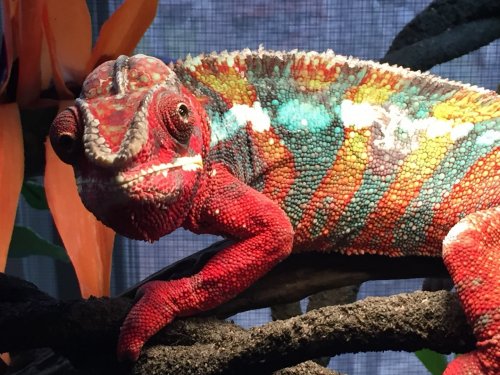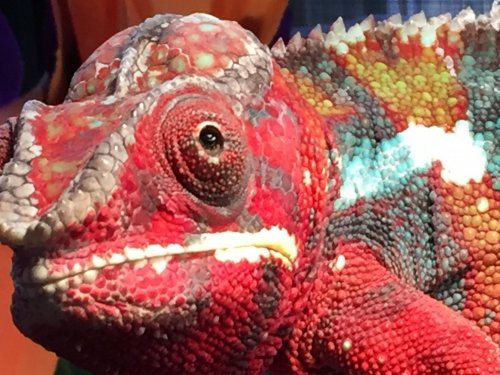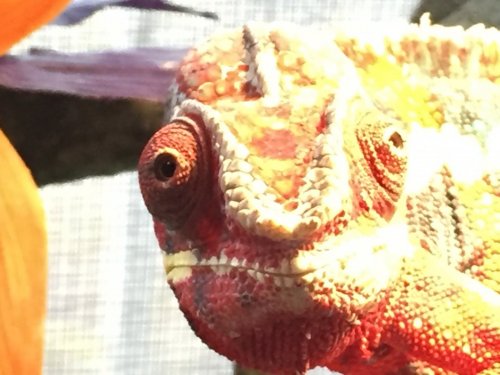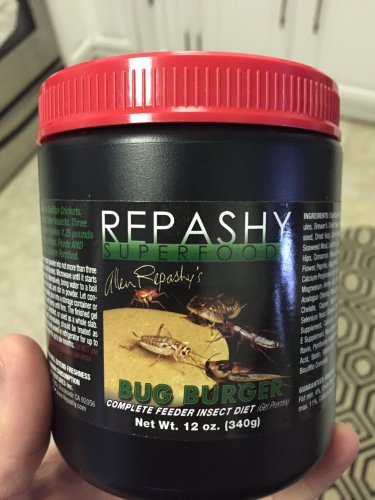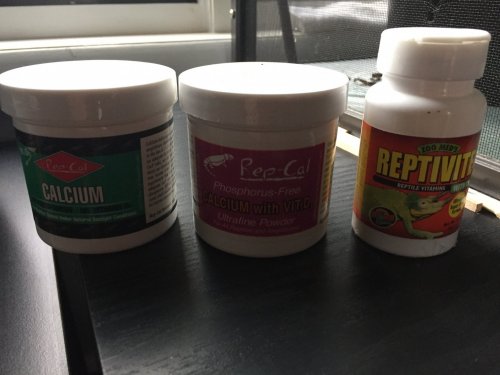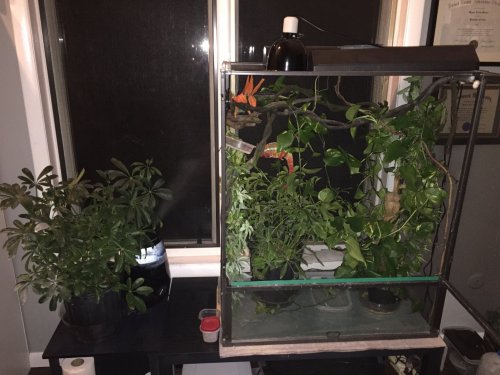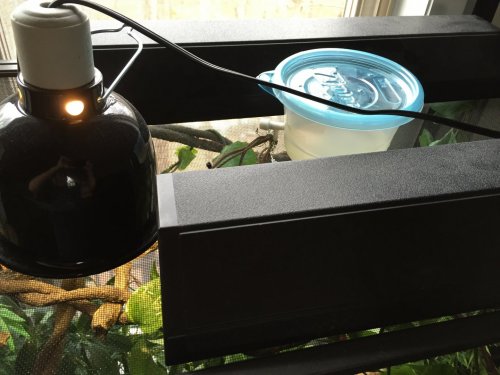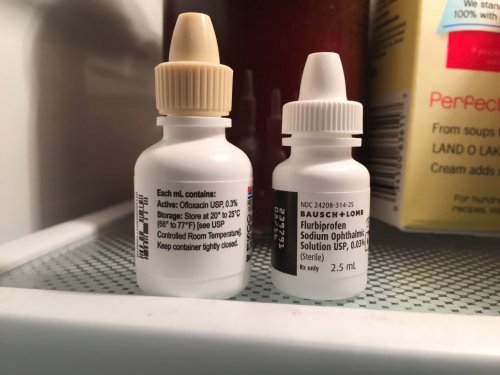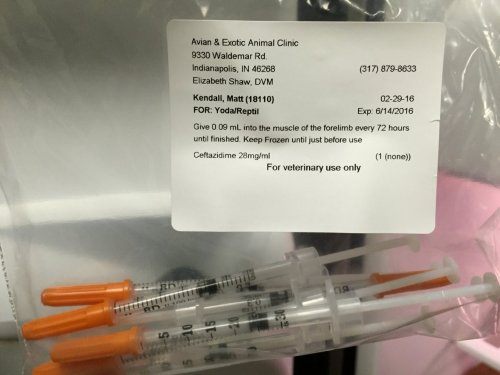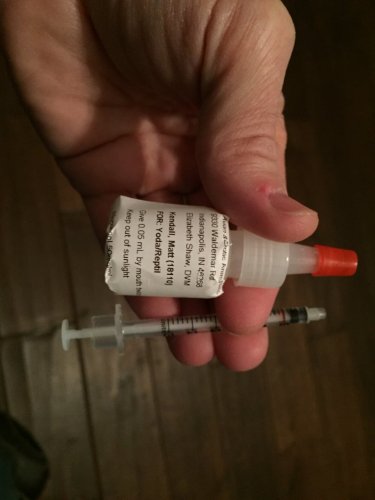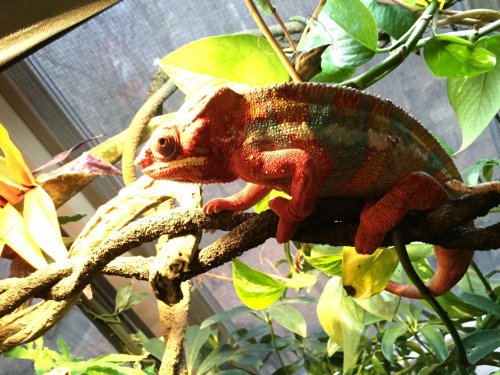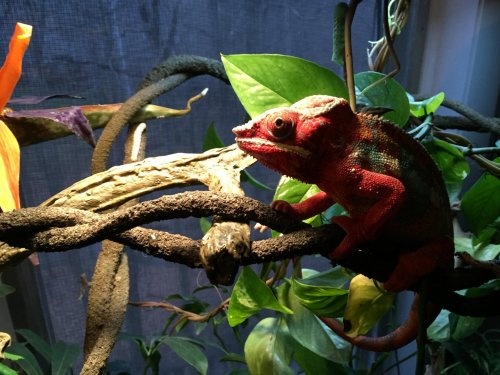M21
Member
I decided to write this post so that hopefully it will give some insight to other members. My Ambilobe Panther Chameleon Yoda is 1.5 years old. Several weeks ago, I noticed he was starting to show discomfort in his left eye. He started closing it a lot. Several days later I noticed it was almost completely black. You couldn't really see the Iris, and he was keeping it closed almost all the time. I decided to take him to the vet to get it checked out. Within days of taking him to the vet, he started dangling his limbs and became lethargic. I will explain more on that later.
Before I continue, I'll list information on his setup including feeders and supplements. I will try to post pictures later of his encloser as well. He is in a relatively large screen encloser. I use a tube fluorescent Reptisun 5.0 T8 and change it every six months. I use a 50W plant grow light and was using a ZooMed Ultra Sun T8 which was also fluorescent. I thought his eye problem could potentially be photo-kerato-conjuctivitis, so I stopped using the ZooMed Ultra Sun immediately. I have multiple vines, a schefflera and pothos in his encloser. I also have a long piece of driftwood. I mist his cage at least twice daily and use a dripper that drips onto the leaves into a Tupperware with a natural sponge. I also use a humidifier to keep up humidity. I typically feed him, hornworms, silkworms, superworms, banana roaches, gutloaded crickets and butterworms. I dust with repcal calcium every feeding. I use reptivite multivitamin with D3 twice a month. I typically dust with repcal calcium with D3 once on the off weeks I'm not using the multi-vitamin. I clean any water that lands on the bottom of the plastic lined encloser and not in the Tupperware daily.
Hopefully that gives everyone some insight to his setup/care. Luckily the vet I took him to is an exotic animal specialist in the Indianapolis area. I told her about his care and setup. She confirmed that my husbandry, supplements and care were all correct. She examined Yoda's eye and luckily found no permanent damage. She suspected that somehow he had poked it causing discomfort and possibly infection. She prescribed Flurbiprofen Sodium Opthalmic Solution and Ofloxacin Opthalmic Solution. She advised me to place drops in his left eye twice daily and wait five minutes in between for eight days. I started the eye treatment and noticed the following day the other negative symptoms (dangling arms/lethargy). I was hoping this was due to the stress from the vet. I called the vet, and she advised me to bring Yoda back in.
She decided to do blood-work due to the new symptoms. She discovered that his uric acid levels were high. She told me it's akin to gout in humans. It is a bad prognosis because that typically means there is a problem with the kidneys and that is hard to treat in chameleons. She ran IV fluids as he was slightly dehydrated as well. She told me she was going to consult with her mentor and come up with the best treatment options. She called me over the weekend and told me she would like to start treating him with Allopurinol orally twice daily along with antibiotics (Ceftazidime) via injection every 72 hours. She believed there was internal bacterial infection as well especially after analyzing his saliva with blood work. She gave me the option to hospitalize him or administer all the meds myself at home. I told her I would rather do it on my own to reduce the stress levels. Also, I would have had to bring in my entire setup with feeders because they did not have that setup at the clinic. She also informed me that when dealing with potential kidney failure, the prognosis is not good and was unsure if the meds would work. She confirmed again that my setup was correct, nothing should be changed, and unfortunately they are unsure of the exact causes of the kidney failure and elevated uric acid levels. She also informed me I should stick to soft-bodied feeders with high water content and not dust with any supplements during his treatment. She advised me to give him warm baths twice daily for a minimum of ten minutes each time as well during his treatment. She said that chameleons are able to absorb small amounts of water through their skin and that it can help with hydration.
The following day Yoda took a major turn for the worse. He was black,stiff and cold. I was certain he would not survive another day. As much as I hated doing it, I decided to go ahead and continue with the treatment. To my surprise, he was still alive the following day. He started drinking as well. Besides offering him water through misting and the dripper, I have started to hold the mister right in front of him and let it drip slowly. He has been drinking that way for two weeks. He drank a considerable amount of water directly from the mister. I do that at least three times a day sometimes over a 20 minute timeframe. To my amazement, he shot his tongue out and ate three silkworms as well. I was planning on force feeding him (vet recommended) if he didn't eat that following day. It had been at least a week since I saw him eat anything. I continued with his two warm baths and oral med treatment. He also had a bowel movement today and the day before yesterday while letting him soak in his bath. It has now been five days since I took him to the vet last. I finished his eye treatment the day before yesterday. It has shown great improvement almost to the point of being back to normal. Yoda is showing signs of improvement with regard to everything. He had become very lethargic and shaky (almost unable to move). He was also keeping both eyes closed off and on the day after the last visit. The last two days he has been much more active. His color has returned to normal. He is not dangling his legs and the shakiness has greatly subsided. Honestly I didn't have much hope for the little guy, but I'm starting to have some optimism that he might pull through. I am going to continue his treatment which should last approximately 2-3 weeks until the meds run out. I am communicating with my vet about his progress and will most likely have blood work done again at the end of his treatment especially if he is continuing to improve.
I wasn't very optimistic about his recovery initially. Chameleons can hide symptoms well until it's too late. I have spent over 400 dollars on his treatment so far and hospitalizing him would have ran me 600-1000 all together. I want him to have the best care, but sometimes it's hard to spend that kind of money especially with a very uncertain long term prognosis. Luckily my job allows me to administer the vets recommended treatment myself and in an environment he's used to, hopefully lowering his stress levels.
I hope that this information is helpful to others out there that may experience similar symptoms with their chameleons. I will try to update his condition throughout. I am very thankful to the Avian & Exotic Animal Clinic in Indianapolis and Dr. Shaw along with her expertise. Because of it, I'm starting to have hope that Yoda will pull through!










Before I continue, I'll list information on his setup including feeders and supplements. I will try to post pictures later of his encloser as well. He is in a relatively large screen encloser. I use a tube fluorescent Reptisun 5.0 T8 and change it every six months. I use a 50W plant grow light and was using a ZooMed Ultra Sun T8 which was also fluorescent. I thought his eye problem could potentially be photo-kerato-conjuctivitis, so I stopped using the ZooMed Ultra Sun immediately. I have multiple vines, a schefflera and pothos in his encloser. I also have a long piece of driftwood. I mist his cage at least twice daily and use a dripper that drips onto the leaves into a Tupperware with a natural sponge. I also use a humidifier to keep up humidity. I typically feed him, hornworms, silkworms, superworms, banana roaches, gutloaded crickets and butterworms. I dust with repcal calcium every feeding. I use reptivite multivitamin with D3 twice a month. I typically dust with repcal calcium with D3 once on the off weeks I'm not using the multi-vitamin. I clean any water that lands on the bottom of the plastic lined encloser and not in the Tupperware daily.
Hopefully that gives everyone some insight to his setup/care. Luckily the vet I took him to is an exotic animal specialist in the Indianapolis area. I told her about his care and setup. She confirmed that my husbandry, supplements and care were all correct. She examined Yoda's eye and luckily found no permanent damage. She suspected that somehow he had poked it causing discomfort and possibly infection. She prescribed Flurbiprofen Sodium Opthalmic Solution and Ofloxacin Opthalmic Solution. She advised me to place drops in his left eye twice daily and wait five minutes in between for eight days. I started the eye treatment and noticed the following day the other negative symptoms (dangling arms/lethargy). I was hoping this was due to the stress from the vet. I called the vet, and she advised me to bring Yoda back in.
She decided to do blood-work due to the new symptoms. She discovered that his uric acid levels were high. She told me it's akin to gout in humans. It is a bad prognosis because that typically means there is a problem with the kidneys and that is hard to treat in chameleons. She ran IV fluids as he was slightly dehydrated as well. She told me she was going to consult with her mentor and come up with the best treatment options. She called me over the weekend and told me she would like to start treating him with Allopurinol orally twice daily along with antibiotics (Ceftazidime) via injection every 72 hours. She believed there was internal bacterial infection as well especially after analyzing his saliva with blood work. She gave me the option to hospitalize him or administer all the meds myself at home. I told her I would rather do it on my own to reduce the stress levels. Also, I would have had to bring in my entire setup with feeders because they did not have that setup at the clinic. She also informed me that when dealing with potential kidney failure, the prognosis is not good and was unsure if the meds would work. She confirmed again that my setup was correct, nothing should be changed, and unfortunately they are unsure of the exact causes of the kidney failure and elevated uric acid levels. She also informed me I should stick to soft-bodied feeders with high water content and not dust with any supplements during his treatment. She advised me to give him warm baths twice daily for a minimum of ten minutes each time as well during his treatment. She said that chameleons are able to absorb small amounts of water through their skin and that it can help with hydration.
The following day Yoda took a major turn for the worse. He was black,stiff and cold. I was certain he would not survive another day. As much as I hated doing it, I decided to go ahead and continue with the treatment. To my surprise, he was still alive the following day. He started drinking as well. Besides offering him water through misting and the dripper, I have started to hold the mister right in front of him and let it drip slowly. He has been drinking that way for two weeks. He drank a considerable amount of water directly from the mister. I do that at least three times a day sometimes over a 20 minute timeframe. To my amazement, he shot his tongue out and ate three silkworms as well. I was planning on force feeding him (vet recommended) if he didn't eat that following day. It had been at least a week since I saw him eat anything. I continued with his two warm baths and oral med treatment. He also had a bowel movement today and the day before yesterday while letting him soak in his bath. It has now been five days since I took him to the vet last. I finished his eye treatment the day before yesterday. It has shown great improvement almost to the point of being back to normal. Yoda is showing signs of improvement with regard to everything. He had become very lethargic and shaky (almost unable to move). He was also keeping both eyes closed off and on the day after the last visit. The last two days he has been much more active. His color has returned to normal. He is not dangling his legs and the shakiness has greatly subsided. Honestly I didn't have much hope for the little guy, but I'm starting to have some optimism that he might pull through. I am going to continue his treatment which should last approximately 2-3 weeks until the meds run out. I am communicating with my vet about his progress and will most likely have blood work done again at the end of his treatment especially if he is continuing to improve.
I wasn't very optimistic about his recovery initially. Chameleons can hide symptoms well until it's too late. I have spent over 400 dollars on his treatment so far and hospitalizing him would have ran me 600-1000 all together. I want him to have the best care, but sometimes it's hard to spend that kind of money especially with a very uncertain long term prognosis. Luckily my job allows me to administer the vets recommended treatment myself and in an environment he's used to, hopefully lowering his stress levels.
I hope that this information is helpful to others out there that may experience similar symptoms with their chameleons. I will try to update his condition throughout. I am very thankful to the Avian & Exotic Animal Clinic in Indianapolis and Dr. Shaw along with her expertise. Because of it, I'm starting to have hope that Yoda will pull through!
